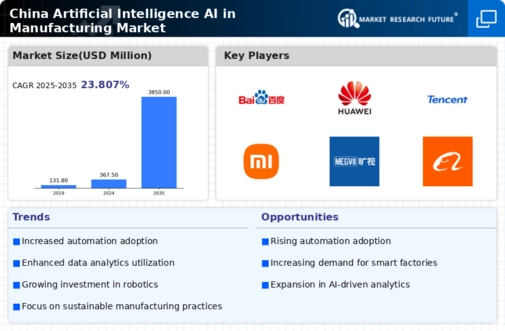Global Competitive Pressure
The competitive landscape in the global manufacturing sector is exerting pressure on Chinese manufacturers to adopt AI technologies, thereby driving the China artificial intelligence manufacturing market. As international competitors increasingly leverage AI to enhance productivity and reduce costs, Chinese firms are compelled to innovate and modernize their operations. This competitive pressure is fostering a culture of continuous improvement and technological adoption within the industry. Moreover, the Chinese government is encouraging collaboration between domestic firms and global tech leaders to facilitate knowledge transfer and innovation. This dynamic interplay between competition and collaboration is likely to accelerate the integration of AI in manufacturing processes, further propelling the growth of the China artificial intelligence manufacturing market.
Rising Demand for Automation
The demand for automation in manufacturing processes is a critical driver of the China artificial intelligence manufacturing market. As industries seek to enhance efficiency and reduce operational costs, the integration of AI technologies becomes increasingly essential. Reports indicate that the automation market in China is projected to reach approximately 1.5 trillion yuan by 2025, with AI playing a pivotal role in this transformation. Companies are increasingly adopting AI-driven robotics and machine learning algorithms to optimize production lines, improve quality control, and minimize downtime. This trend not only boosts productivity but also addresses labor shortages in certain sectors, further propelling the growth of the China artificial intelligence manufacturing market.
Advancements in AI Technologies
Technological advancements in AI are significantly influencing the China artificial intelligence manufacturing market. Innovations in machine learning, natural language processing, and computer vision are enabling manufacturers to implement smarter solutions that enhance operational efficiency. For instance, AI-driven predictive maintenance systems are being adopted to foresee equipment failures, thereby reducing downtime and maintenance costs. The market for AI technologies in manufacturing is expected to grow at a compound annual growth rate of over 25% in the coming years. Such advancements not only improve productivity but also facilitate the development of customized products, allowing manufacturers to respond more effectively to consumer demands. This dynamic evolution of AI technologies is likely to be a key driver in the China artificial intelligence manufacturing market.
Increased Focus on Data Utilization
The growing emphasis on data utilization is reshaping the landscape of the China artificial intelligence manufacturing market. Manufacturers are increasingly recognizing the value of data analytics in driving decision-making processes and enhancing operational efficiency. The integration of AI with big data analytics allows companies to extract actionable insights from vast amounts of data generated during production. This trend is expected to lead to a more data-driven approach in manufacturing, with the market for AI-powered data analytics projected to reach 500 billion yuan by 2026. By leveraging data effectively, manufacturers can optimize supply chains, improve product quality, and enhance customer satisfaction, thereby driving growth in the China artificial intelligence manufacturing market.
Government Support and Policy Framework
The China artificial intelligence manufacturing market benefits significantly from robust government support and a comprehensive policy framework. The Chinese government has implemented various initiatives aimed at fostering AI development, including the 'New Generation Artificial Intelligence Development Plan' which outlines ambitious goals for AI integration across multiple sectors. This policy aims to position China as a global leader in AI by 2030, potentially increasing the market size to over 1 trillion yuan. Furthermore, local governments are incentivizing AI startups through funding and tax breaks, which enhances innovation and competitiveness within the industry. Such supportive measures are likely to accelerate the adoption of AI technologies in manufacturing, thereby driving growth in the China artificial intelligence manufacturing market.





















